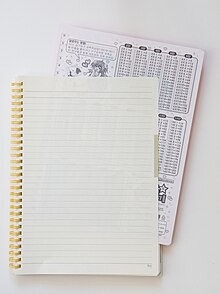| This article needs additional citations for verification. Please help improve this article by adding citations to reliable sources. Unsourced material may be challenged and removed. Find sources: "Pencil board" – news · newspapers · books · scholar · JSTOR (June 2024) (Learn how and when to remove this message) |

Shitajiki (下敷き, lit. "Underlay") is a Japanese word for various types of materials placed under a sheet of paper for writing, either to prevent marking on the sheets below or to provide a better surface for writing. They are usually referred to as pencil boards in English.
Shitajiki for handwriting are generally made of plastic about 1 to 2 mm in thickness, making them flexible but still durable. Typically, they are B5 sized (slightly smaller than U.S. letter size), although other sizes are also available (typically A4 or A5). Shitajiki for calligraphy are typically made of dark (blue or black) felt, and are available in a variety of sizes.
Merchandised shitajiki are very common, featuring images of everything from tourist attractions and celebrities to anime and manga characters. Most shitajiki designs only go through one print run, making them highly collectible and often difficult to acquire. Collecting shitajiki is a hobby for many anime and manga enthusiasts. As collectibles, shitajiki are also often used for decoration or other ornamental purposes.
References
- Schnee, Dan (November–December 2018). "A Creative Approach to Chords & Scales". Canadian Musician. Retrieved June 4, 2024 – via Gale General OneFile.
This article related to the culture of Japan is a stub. You can help Misplaced Pages by expanding it. |